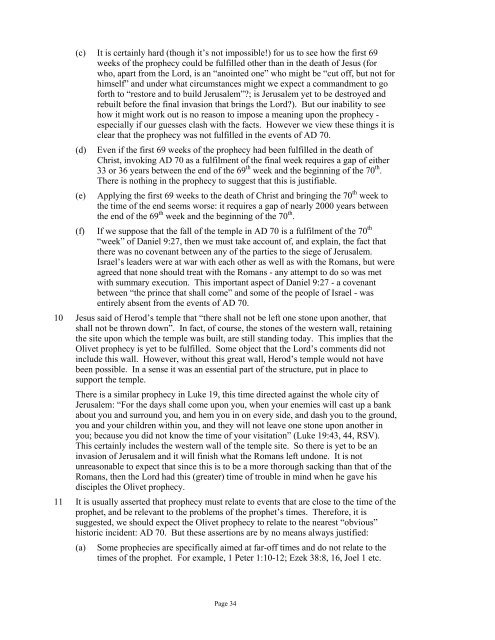Handout - Western Christadelphian Bible School
Handout - Western Christadelphian Bible School
Handout - Western Christadelphian Bible School
Create successful ePaper yourself
Turn your PDF publications into a flip-book with our unique Google optimized e-Paper software.
(c) It is certainly hard (though it’s not impossible!) for us to see how the first 69<br />
weeks of the prophecy could be fulfilled other than in the death of Jesus (for<br />
who, apart from the Lord, is an “anointed one” who might be “cut off, but not for<br />
himself” and under what circumstances might we expect a commandment to go<br />
forth to “restore and to build Jerusalem”?; is Jerusalem yet to be destroyed and<br />
rebuilt before the final invasion that brings the Lord?). But our inability to see<br />
how it might work out is no reason to impose a meaning upon the prophecy -<br />
especially if our guesses clash with the facts. However we view these things it is<br />
clear that the prophecy was not fulfilled in the events of AD 70.<br />
(d) Even if the first 69 weeks of the prophecy had been fulfilled in the death of<br />
Christ, invoking AD 70 as a fulfilment of the final week requires a gap of either<br />
33 or 36 years between the end of the 69 th week and the beginning of the 70 th .<br />
There is nothing in the prophecy to suggest that this is justifiable.<br />
(e) Applying the first 69 weeks to the death of Christ and bringing the 70 th week to<br />
the time of the end seems worse: it requires a gap of nearly 2000 years between<br />
the end of the 69 th week and the beginning of the 70 th .<br />
(f) If we suppose that the fall of the temple in AD 70 is a fulfilment of the 70 th<br />
“week” of Daniel 9:27, then we must take account of, and explain, the fact that<br />
there was no covenant between any of the parties to the siege of Jerusalem.<br />
Israel’s leaders were at war with each other as well as with the Romans, but were<br />
agreed that none should treat with the Romans - any attempt to do so was met<br />
with summary execution. This important aspect of Daniel 9:27 - a covenant<br />
between “the prince that shall come” and some of the people of Israel - was<br />
entirely absent from the events of AD 70.<br />
10 Jesus said of Herod’s temple that “there shall not be left one stone upon another, that<br />
shall not be thrown down”. In fact, of course, the stones of the western wall, retaining<br />
the site upon which the temple was built, are still standing today. This implies that the<br />
Olivet prophecy is yet to be fulfilled. Some object that the Lord’s comments did not<br />
include this wall. However, without this great wall, Herod’s temple would not have<br />
been possible. In a sense it was an essential part of the structure, put in place to<br />
support the temple.<br />
There is a similar prophecy in Luke 19, this time directed against the whole city of<br />
Jerusalem: “For the days shall come upon you, when your enemies will cast up a bank<br />
about you and surround you, and hem you in on every side, and dash you to the ground,<br />
you and your children within you, and they will not leave one stone upon another in<br />
you; because you did not know the time of your visitation” (Luke 19:43, 44, RSV).<br />
This certainly includes the western wall of the temple site. So there is yet to be an<br />
invasion of Jerusalem and it will finish what the Romans left undone. It is not<br />
unreasonable to expect that since this is to be a more thorough sacking than that of the<br />
Romans, then the Lord had this (greater) time of trouble in mind when he gave his<br />
disciples the Olivet prophecy.<br />
11 It is usually asserted that prophecy must relate to events that are close to the time of the<br />
prophet, and be relevant to the problems of the prophet’s times. Therefore, it is<br />
suggested, we should expect the Olivet prophecy to relate to the nearest “obvious”<br />
historic incident: AD 70. But these assertions are by no means always justified:<br />
(a) Some prophecies are specifically aimed at far-off times and do not relate to the<br />
times of the prophet. For example, 1 Peter 1:10-12; Ezek 38:8, 16, Joel 1 etc.<br />
Page 34







